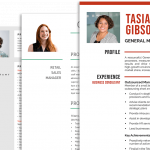I was having coffee with a friend a few months ago who worked in HR and used to write resumes about 15 years ago. She was telling me that she offered to help out a friend’s daughter who needed to write a resume from scratch to start applying for jobs after leaving University. She said she did a quick google search to work out what people were doing these days, and quickly realised too much had changed and she probably wasn’t qualified to help with resumes anymore.
If you haven’t written a resume in a while (or ever), you might not be up to date with today’s best practices. Information that used to be mandatory, including a Career Summary table or a Resume Objective, are considered a waste of useful space these days.
Here are our most common mistakes and how to avoid them.
1. Not providing enough information about what you did in each role
It does take time and can be extremely frustrating to write up a list of responsibilities for each role you have held, however, this information is crucial for potential employers. If a hiring manager can’t quickly skim a clear and concise list of the day-to-day activities you were responsible for, it is very difficult for them to imagine you in their role. Especially if you are looking to change industries, it is really important to break down what you did so it can easily be translated.
2. Not providing evidence of what you have achieved
All employers want to find talented individuals who are going to make a difference to their bottom line. They want to know that you have been reliable and received excellent performance reviews from your supervisors. They want to see the dollar value of improvements you made to sales, or how you increased the staff retention rate, or that you grew a client database. They want to know you have won awards, or that you have identified problems and solved them. The more measurable achievements you can list on your resume, the closer you are to getting an interview.
3. Overusing descriptive words
Trying to sound clever and important by including excessive adverbs and adjectives is annoying. For example, ‘quickly and accurately took customers’ meal orders’ is overkill and unnecessary. Keep your writing simple and concise. Don’t sacrifice your natural ‘voice’ to try to sound more intellectual. It has the opposite effect.
4. Using trendy job titles
If your job title is something like ‘Dream Designer’ or ‘Chief Happiness Officer’ or ‘Number Ninja’, you need to ditch it from your resume. If a hiring manager or recruiter has to guess what your role was, there is every chance you will end up in the slush pile. It is much wiser to simply use the common industry job titles that are easily recognised and understood.
5. Not including essential personal details
The most important information on your resume is your name, your email address, your mobile phone number, and the location you want to work in. I can’t believe I have to type this, but the number of candidates who go to all the trouble of creating and submitting an application that leaves some or all of these details off their resume is staggering. These 4 things need to be really easy for a recruiter to locate and potentially repeated on every page.
6. Not properly utilizing the skills section
I am sure you have heard of Key Words and how important it is to include them in your resume? Well, this is where you list them. Our advice is to go through the job ad with a fine-tooth comb and look for all of the skills they mention and pop them in the Skills section. If the position description mentions they are looking for someone with attention to detail, and you do have high attention to detail, pop it in. If they mention they need someone who can present over Zoom, and you are experienced at that, list it here.
7. Being lazy with the length
Recruiters and hiring managers receive heaps of resumes for every role they place, and the last thing they want to do is to have to read a short autobiography of your life so far. The shorter and more concise you can keep your resume, the more impressive you will be to them. It is important to respect their time and make sure you are keeping your resume to 2 pages, 3 at a push. The time you spend keeping your information relevant, the more likely you are to be rewarded with a call-back.
If you are having trouble pulling a current resume together and ensuring it includes all relevant information in a professional template, check out the RecruitableHub Resume Writer. Think auto-prompt forms with pre-written text and examples you can choose and tailor, all laid out in a logical order. We have a free option so you can try before you buy. Click here to get started.
try.








